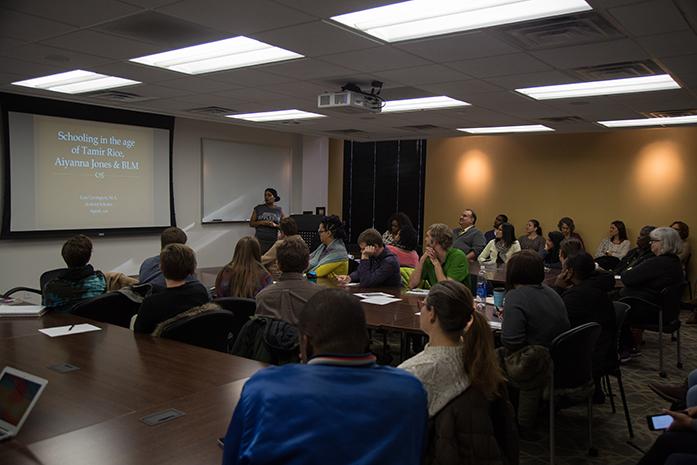By Naomi Hofferber
The challenges faced by students in the K-12 system can be difficult, but when issues of racism, systematic oppression, and implicit bias are considered, schooling can become a system that is especially harmful for youth of color.
Lisa Covington, an activist and doctoral candidate in sociology at the University of Iowa and an instructor both there and at San Diego State University, gave a presentation to the College of Education’s Diversity Committee titled “Schooling in the age of Tamir Rice, Aiyana Jones, and #BlackLivesMatter: A Discussion on Implicit Bias, Blatant Racism, and the Impact on Students of Color.”
The presentation and subsequent discussion addressed challenges students of color face in regards to lack of representation throughout the education system — specifically in courses regarding history and current issues — implicit biases by instructors, societal expectations placed on students of color, and the efect that issues of police brutality and racism have on students.
“As far as implicit bias is concerned, there’s been lots of training that’s very popular now and I think that is great, but we also need to recognize individual implicit bias, and also the institutional and systematic racism that happens within school systems,” Covington said.
Covington gave various tips to educators, which included keeping in mind the realities students of color face, not letting sympathy replace positive actions for students, understanding the environment students are coming from, and reminding students that they are “young, gifted, and black.”
“Conversations like today hopefully allow us to talk about things like teacher perception of students of color, the ratio of faculty to students — at the college level or at the school district level K-12,” Covington said. “All of those things are really important, and they’re not unique to Iowa City.”
In the presentation, Covington noted the statistic that every 28 hours, a black individual is killed by police, vigilantes, security guards, or those protected by the law. This finding comes from a highly disputed study completed by the Malcolm X Grassroots Movement, which found that in 2012, 313 black individuals were killed by police, vigilantes, security guards, or those protected by the law.
Covington said that the national environment of racism and violence can affect students of color.
The UI Student Government and the UI have implemented several plans to tackle issues of diversity and institutional racism, including doing more recruitment and retention of underrepresented staff and offering cultural competency training not just for faculty but expanding it to local businesses through the Building Better Bridges program.
“It’s tough because so much of it is institutionalized,” UISG President Rachel Zuckerman said. “But in the face of all that, I still believe in the power of the individual to make a change.”
Zuckerman said it’s important to speak out against racism and to be an active bystander when confronted with blatant racism, and even though policies can be enacted, it’s up to individuals to also advocate for change.
“I think that students are often the leaders in movements like Black Lives Matter, like the Civil Rights Movement, [where] the sit-ins that happened during and leading up to it, were usually [started by] students,” Covington said. “We have to know our history around the fact that historically, college students especially have lead these movements around recognizing and calling attention to injustice.”
This past year, the Diversity Committee began to bring in guest speakers to its meetings, like Covington, and Wednesday’s attendance was some of the largest in the meeting’s history, said Jason Harshman, the faculty co-head of the Diversity Committee.
Along with guest speakers and meetings, the Diversity Committee holds several annual events to promote diversity.
“Every year, we do a Graduate Research Forum, [which is] a session for graduate students in the College of Education to highlight the research that they’re doing around these issues that fall under the category of social justice work, diversity in education, and the like,” Jason Harshman, the faculty co-chair for the Diversity Committee, said. “We also do a diversity and education conference every spring. It is open to everybody on campus.”



